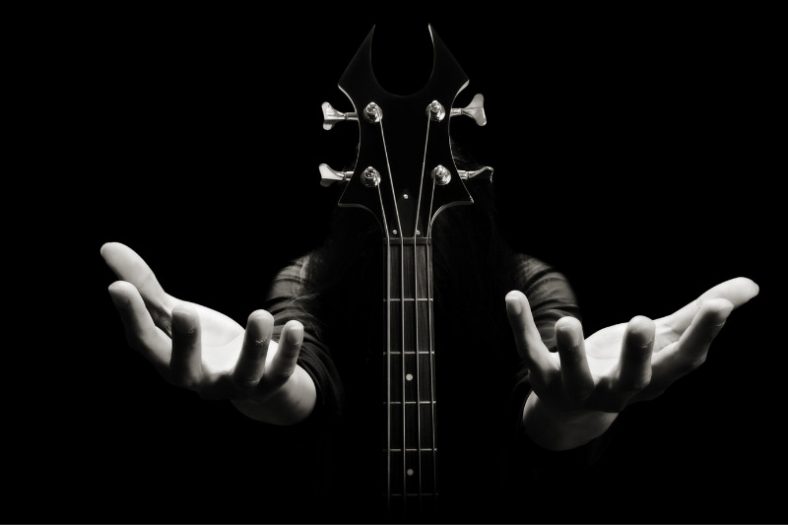Why Do People Like Metal Music?

People like metal music because it can be thrilling, it can be quite complex in a positive way, and it can give a voice to outsiders. Metal is a very wide genre with many diverse sub-genres.
Many people shy away from the genre for unnecessary reasons. Although metal is frequently associated with screaming, it is much more than that. People are drawn to metal because it is complicated, distinctive, and mentally demanding.
Listeners tend to be confused about the appeal of metal music, and what metal entails in general.
Yes, metal can be loud. Yes, it may involve harsh screaming or growling. But the truth is that metal is SO much more than just being loud and angry.
In this article, we are going to explore some facets of metal and why metalheads love it, and hopefully dispel some misconceptions along the way.
Contents
1. It can be thrilling

Metal’s energy and adrenaline rush are the main reasons why people like it.
Broadly speaking, the sound of metal is characterized by thundering guitars and pummeling rhythms. While the energy and speed of metal might not be everyone’s cup of tea, for metalheads, it can be a form of positive sensory overload.
That’s what makes metal such a great soundtrack for the gym or other tasks where you need to get pumped up. If you’re feeling lethargic and need a quick dose of adrenaline, some nasty metal riffage might just be what you need to get energized!
2. Metal can be ‘intelligent’ music
Due to its complex nature, metal music is interesting, to say the least for most individuals.
No, this doesn’t mean that you’ll need to solve differential equations to be able to listen to the next Tool record (although who can be sure with those guys). Metal music is often complex and demanding to listen to and understand. It also often addresses non-mainstream themes and emotions, frequently drawing from literature and science.
This report talks about a study that found that a large proportion of students belonging to the National Academy for Gifted and Talented Youth listed metal as their favorite genre. It isn’t too much of a stretch to imagine that an outsider genre like metal that requires mental and musical investment, appeals to those of an intellectual bend.
However, this isn’t to say that metal is always cerebral and serious; it can be equally fun and liberating for a casual headbanging session!
3. Metal gives a voice to outsiders
With metal’s reputation as a ‘weird’ and ‘rebellious’ genre, individuals, especially youngsters who are outsiders amongst their peers tend to gravitate towards it as a source of comfort and solidarity.
There is a sense of identification with metal’s own status as a genre that refuses to stay down despite never quite being accepted by the mainstream.
This is also the reason why metal fans tend to be very loyal to the genre and towards the metal community as a whole. Metal becomes a common language and symbol of pride for all its fans who don’t quite ‘fit in’ – not because they can’t, but because they don’t need/want to.
4. There are a lot more subgenres than you might realize

Metal has a long history and has many different subgenres, including Heavy Metal, Thrash Metal, Power Metal, Symphonic Metal, Glam Metal, Black Metal, Industrial Metal, and others.
I always say there is metal out there for everyone. From its arguable origins with Black Sabbath and the New Wave of British Heavy Metal in the 1960s, metal has expanded to become an umbrella term for a staggering variety of music. Yes, ‘blackened tech-death’ is an actual metal subgenre, not the name of a futuristic plague.
Some subgenres like thrash metal and heavy metal have seen considerable mainstream popularity with bands like Metallica and Iron Maiden, the former featuring fast aggressive riffing and drums with James Hetfield’s snarled vocals, and the latter embracing a more melodic approach with soaring guitar harmonies and Bruce Dickinson’s operatic delivery.
The guttural growled or screamed vocals that are often stereotypically associated with metal actually occur in a relatively small percentage of metal, in subgenres like death metal, black metal, and metalcore. Other subgenres take a far more melodic approach, like symphonic metal, progressive metal, power metal, and so on.
The ever-increasing number of subgenres has become something of an inside joke within the metal community, but it only goes to show that there is metal out there to cater to everyone. If you haven’t found a single metal song you like, you just haven’t looked hard enough!
5. Metal is usually more complex than mainstream music
When compared to mainstream music, metal music far outweighs in complexity and intrigue of most mainstream music genres.
Metal’s penchant for playing fast and tight means that it can be much more musically demanding than the average pop song to play. Listeners who appreciate the musical skill, therefore, gravitate to metal for its precision and technical aspects.
Shredding guitar solos, thunderous blast beats, or even growled and screamed vocals involve considerable technique to pull off, which makes metal a perfect match for those looking for musical proficiency. It makes sense, therefore, that a lot of metalheads are musicians themselves.
Some subgenres of metal like progressive metal, technical death metal, or avant-garde metal especially focus on technical virtuosity. They stray away from conventional songwriting norms to explore complex and changing scales, harmony, song structures, odd time signatures, and themes. It’s not unusual for metal songs to run well over 15 minutes while exploring heady philosophical topics or concept storylines.
6. Metal can be healthy
Metal music has been shown to have a positive effect on people’s physical health.
Most people probably don’t know this but a recent study shows that metal music can decrease blood pressure.
It was a study by the Vera Clinic situated in Turkey in 2021. It was essentially a stress test brought to a group of people which were then observed while listening to different types of music genres.
In the end, the conclusion was that many genres have different effects on people, however, metal music showed that it lowers a person’s blood pressure and heart rate. The only genre to outmatch metal music in this aspect is 80s pop music.
Still, considering the nature of metal music, most people probably don’t even notice this fact but it seems that it does have positive health benefits as well.
Another interesting fact to note is that metalheads also have a tendency to better handle their emotions and this is because the nature of metal and its extremeness allows for it.
The Psychology of Metal Music

Heavy metal music is often associated with controversy due to its tremendous sound and inflammatory lyrics. On the other hand, metal is a more positive representation of anger that allows for healthy and creative expression.
Researchers have often wondered what exactly makes certain people like metal. After all, it is a challenging, intense, and demanding genre that staunchly rejects the mainstream, and remains rejected by the mainstream. Could people who like metal have some common traits that make them drift towards this genre?
This article talks about a study at the University of Westminster in the U.K. that surveyed participants who rated metal songs and answered questions about their personality traits, need for uniqueness, self-esteem, and attitude towards authority.
The researchers found a correlation between a fondness of metal and a dislike of authority, a need for uniqueness as well as somewhat lower self-esteem. Empirically this makes sense since metal is known to have anti-establishment themes or even in itself be a rejection of mainstream musical conventions.
As mentioned before, metal is often a source of comfort and relatability to social outsiders, who often have low self-esteem. Listening to metal is an act of solidarity and helps boost self-esteem in a form of catharsis.
While this research may not be representative of the whole metal community, it is an important step towards understanding the psychological appeal of metal and avoiding stereotyping its listeners as angry or violent people.
Stereotypes about metalheads
Metal tends to embrace darker and more graphic themes that convey emotions like anger and despair. This often leads to people stereotyping metal fans as people glorifying violence and being angry, aggressive people.
George ‘Corpsegrinder’ Fisher of Cannibal Corpse, renowned for their graphic and gory lyrical imagery and artwork, dispels this misconception by comparing their music to horror films and books. Just because a movie or book depicts graphic violence or embraces dark themes, it doesn’t mean they glorify them. The same goes for metal music.
Conveying negative emotions through music like metal can be a healthy outlet for these emotions in listeners. Just like with happy music, listening to an angry song might resonate with one’s anger and in turn help channel and finally placate it.
The themes of metal, therefore, do not reflect the actual personalities of metal listeners. This study finds that metalheads tend to be more well-adjusted and well-rounded adults than their (non-metal fan) peers.
Summary
Metal music, with its head-banging rhythms, dark themes, and explosive sound can be cathartic for some people. However, metalheads are more well-adjusted individuals who embrace the darker side of music to channel their negative emotions.
The thing that draws people to metal music, in my opinion, isn’t its sound but the way it lets fans express themselves. The dark themes and head-banging rhythms simply back up this claim.
Due to its complexity and the depth of ideas a song can contain, a metal song can be an expression of anger and alienation, fitting for these outcasts.
In comparison to other genres, metal tunes are typically longer and more complex, thus containing a lot of depth and content to them. While other genres like pop or R&B promote happy, positive feelings through catchy melodies and straightforward lyrics, metal music explores dark themes and shows the complexity of human emotions.





